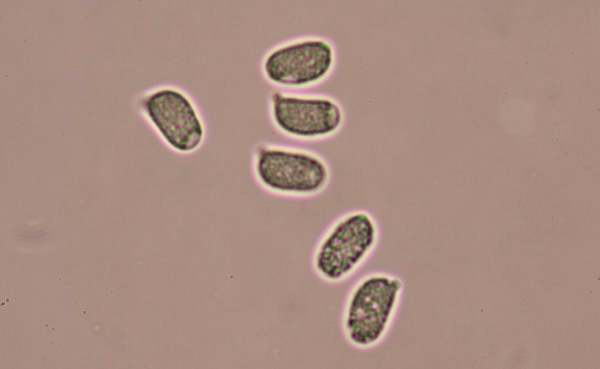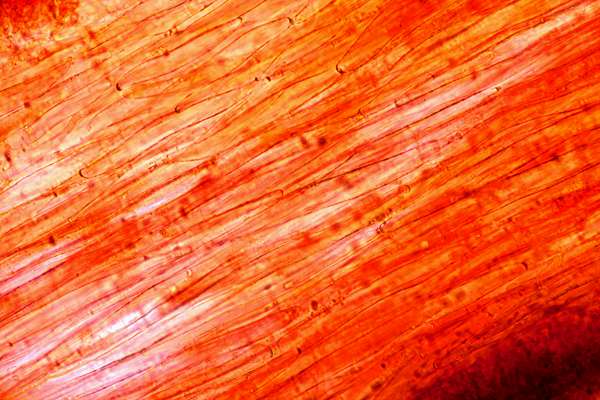Hygrocybe glutinipes (J. E. Lange) R. Haller Aar. - Glutinous Waxcap
Phylum: Basidiomycota - Class: Agaricomycetes - Order: Agaricales - Family: Hygrophoraceae
Distribution - Taxonomic History - Etymology - Identification - Culinary Notes - Reference Sources
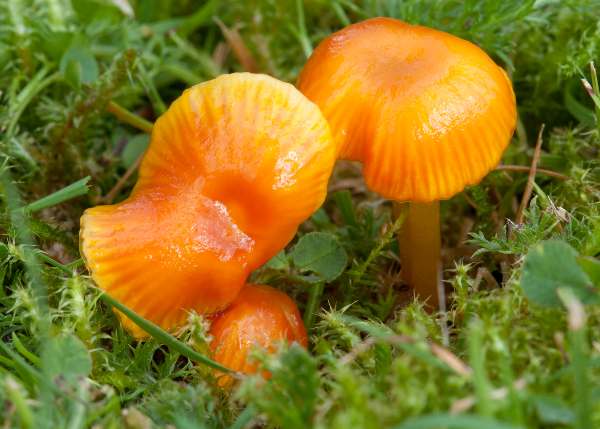
Slimy is not the word for this little waxcap: blobs of thick glutinous mucus cling to the stems in wet weather, and the caps are persistently slimy or sticky even in old specimens.
One other fascinating feature of Hygrocybe glutinipes is that it comes in two very different colour varieties, the more common being orange and a much rarer variety being a startlingly bright red, looking rather like a very slimy Scarlet Waxcap Hygrocybe coccinea, at least at first glance.
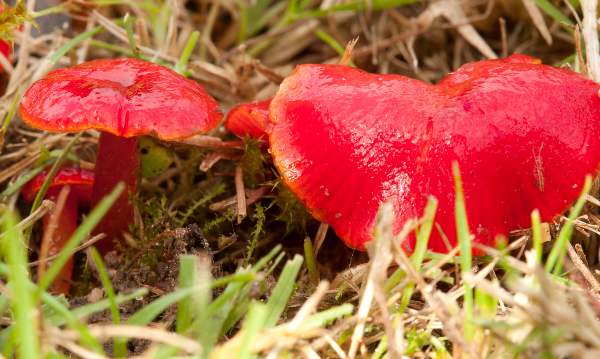
Distribution
The orange variety of Hygrocybe glutinipes is an occasional find throughout Britain and Ireland.
Hygrocybe glutinipes var. rubra (the red variety) is very rarely recorded in Britain and Ireland, but it has been formally recorded in England, Scotland and Wales. The majority of records of this rare variety are from people with a special interest in grassland fungi, and so it may be that many more sightings are being misidentified and that the red variety is actually rather more common than the official records seem to suggest.
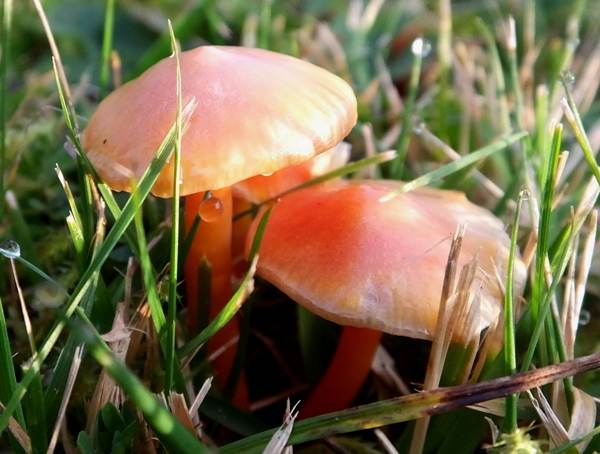
Taxonomic history
Described in 1940 by Danish mycologist Jakob Emanuel Lange (1864 - 1941), the Glutinous Waxcap was initially given the scientific name
Hygrocybe citrina var. glutinipes.
In 1956, Swedish mycologist R. Haller Aar. (Does Aar. mean 'junior'?... differentiating this author from R. Haller Suhr?) raised this mushroom to the rank of species, renaming it Hygrocybe glutinipes. since the separation of the red variety in 1983, the nominate form is now recorded as Hygrocybe glutinipes var. glutinipes.
Synonyms of Hygrocybe glutinipes var. glutinipes include Hygrophorus glutinipes (J. E. Lange) P. D. Orton, Hygrocybe citrina (Rea) J. E. Lange var. glutinipes J. E. Lange, and Hygrocybe. aurantioviscida Arnolds.
Hygrocybe glutinipes var. rubra has an even shorter taxonomic history. This lovely little waxcap was first described and given its current scientific name by French mycologist Marcel Bon in 1983.
Etymology
The genus Hygrocybe is so named because fungi in this group are always very moist. Hygrocybe means 'watery head'. The specific epithet glutinipes means 'with a glutinous foot' - a reference to the blobs of slime that adhere to the stems of these little waxcaps.
Identification guide
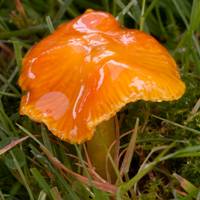 |
CapInitially hemispherical, the cap expands to become convex or bell shaped and eventually more or less flat with a slightly depressed centre, 0.5 to 3cm in diameter; slimy; ranging in colour between lemon-yellow and yellow-orange in the centre (bright red to scarlet-orange in Hygrocybe glutinipes var. rubra) with a slightly paler, striate margin. |
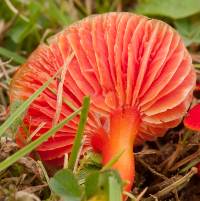 |
GillsThe yellow or pale orange gills (red in Hygrocybe glutinipes var. rubra, shown on the left) are broadly adnate often with a slightly decurrent tooth; their spacing is moderately distant. Stem1.5 to 3mm in diameter and 1.5 to 4cm tall, the stems are extremely slimy; stems of var. glutinipes vary in colour between yellow and orange. (Stems of Hygrocybe glutinipes var. rubra are red.) |
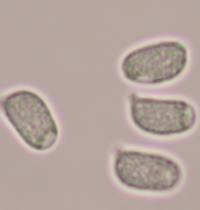 |
SporesBroadly ellipsoidal to ellipsoid-oblong, often with a central restriction; 8-10 x 4-5μm; inamyloid.
Spore printWhite. BasidiaFour-spored. |
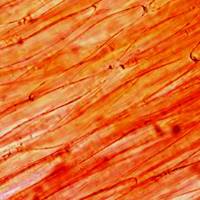 |
Gill tramaRegular (see photomicrograph, left)
|
Odour/taste |
Not distinctive. |
Habitat & Ecological role |
Closely cropped or mown grassland where artificial fertilisers are not spread; also occasionally in or on the edges of deciduous and mixed woodland. Waxcaps have long been considered to be saprobic on the dead roots of grasses and other grassland plants, but it is now considered likely that there is some kind of mutual relationship between waxcaps and mosses. |
Season |
September to November in Britain and Ireland. |
Similar species |
This is the waxcap with most glutinous stem, but in wet weather it could be mistaken for Gliophorus laetus, which is differentiated by its greyish gills. Hygrocybe reidii is also yellow-orange but it is readily distinguished by the honey-like odour of its crushed stem base. |
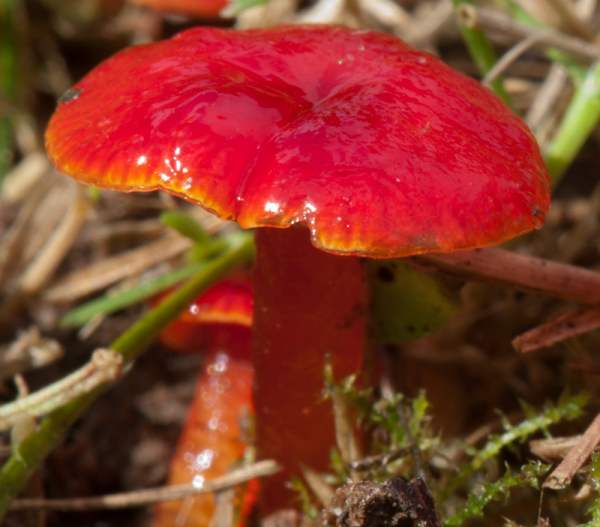
Culinary Notes
The Glutinous Waxcap is too small to be of culinary interest, and its glutinous nature is another serious deterrent to anyone looking for a mushroom meal.
Reference Sources
Fascinated by Fungi, 2nd Edition, Pat O'Reilly 2016, reprinted by Coch-y-bonddu Books in 2022.
Fungi of Northern Europe, Volume 1 - The Genus Hygrocybe, David Boertmann, 2010.
British Mycological Society English Names for Fungi
Dictionary of the Fungi; Paul M. Kirk, Paul F. Cannon, David W. Minter and J. A. Stalpers; CABI, 2008
Taxonomic history and synonym information on these pages is drawn from many sources but in particular from the British Mycological Society's GB Checklist of Fungi.
Acknowledgements
This page includes pictures kindly contributed by David Kelly.
Fascinated by Fungi. Back by popular demand, Pat O'Reilly's best-selling 450-page hardback book is available now. The latest second edition was republished with a sparkling new cover design in September 2022 by Coch-y-Bonddu Books. Full details and copies are available from the publisher's online bookshop...

